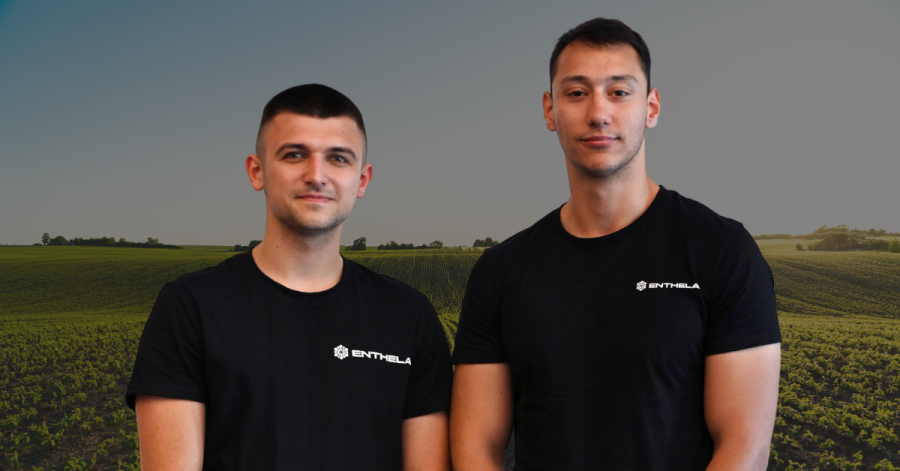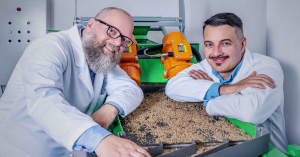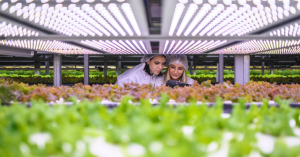By 2050 the world would need to produce about 70% more food to feed an estimated 9 billion people.
Climate change is deepening agricultural challenges, with rising temperatures, shifting ecosystems, invasive pests, and more frequent extreme weather reducing crop yields, grain quality, and livestock productivity.
Moreover, agribusiness is an essential sector that hasn’t been recognized for its sustainable practices. However, in recent decades, there has been a gradual shift towards sustainability, through implementing specific measures, including the phasing out of certain harmful pesticides.
Bulgarian startup Enthela, founded in 2023 by Martin Nedev and Angel Hristov, creates a bio stimulator based on nitrogen-fixing bacteria that allows farmers to replace the use of nitrogen fertilizers while maintaining yields.
The startup has already participated and won numerous competitions and accelerators in Bulgaria, including Elevate by the American University in Bulgaria.
Enthela won the Innovation Champion award by The Recursive in the annual competition “Best Youth Startup in Bulgaria 2024” by the Fund of Funds and Sofia University. Martin Nedev shared more on their future plans.
“Best Youth Startup in Bulgaria 2024” competition’s final was held on May 31 in the Aula of Sofia University “St. Kliment Ohridski.” This is the third edition, organized by the Fund of Funds and the Faculty of Economics at Sofia University. Nearly 300 participants, competing as teams or individuals, took part in the event. They all had the opportunity to engage in a 10-week training program, in which they developed their ideas under the mentorship of experts from 40 partner organizations in Bulgaria’s investment and startup ecosystem.
The Recursive: Given the environmental and economic challenges associated with traditional nitrogen fertilizers, could you explain how your biostimulant addresses these issues and contributes to sustainable farming practices?
Martin Nedev: Nitrogen fertilizers were one of the main reasons for the increase of the global population. However, its usage by farmers has its downsides. When used in agriculture, more than 50% of the nitrogen is not absorbed by plants. Therefore it runs off in soils, water, and air which leads to soil-degradation, biodiversity loss, and gas emissions. The impacts are not just for the environment, but farmers start to consider nitrogen fertilizers are not really cost-efficient due to the more than 50% value lost to the soil.
It is clear that new methods are necessary and we have found a solution in the face of growth-promoting bacteria. Microbial solutions in agriculture is not a new concept. However, currently microbial products are not completely accepted from the market due to their ineffectiveness. Volatile conditions, climate factors and microbial competition are some of the factors which affect the microbes’ resilience and therefore their effectiveness. This is why we are implementing a tailored biotechnological method to enhance nitrogen-fixing bacteria’s ability to survive in the harsh conditions of the soil, and therefore provide more nitrogen for the plants.
We are aiming for substituting up to 50% of farmers’ synthetic nitrogen usage. Accomplishing our mission will lead to less nitrogen run-off which means healthier soil, less biodiversity loss, and less gas emissions produced from the nitrogen manufacturing plants.
Could you elaborate on the stage your company is currently in?
Enthela is currently in a Research and Development stage. More concretely up until now we have already combined some few very important pieces of the puzzle. Firstly and most importantly, I would like to announce that we just completed one of the first (if not the first) practical spin-off companies in Bulgaria with UCTM, a leading research institution with experienced scientific specialists in the biotechnological sphere, who will be monitoring the R&D process and advising us on Product Development. In addition, we managed to attract 2 young and ambitious scientists who will be running day-to-day operations full-time in our laboratory. Also we are joined by a part-time consultant from Portugal who has been working in 2 other microbial fertilizer start-ups in Israel and Portugal. With this amazing team we have already structured a really comprehensive R&D plan for the next 10-12 months, and we have started laboratory experiments with already selected bacteria.
Could you outline the key goals and milestones you’re focused on right now?
In the next 12 months we are fully focused on proving that our biotechnological method can show increased effectiveness in comparison to traditional microbial fertilizers. First step is to complete the enhancement in the laboratory setting. Then we have planned a small-scale testing. After that, we plan on raising a seed-round to fund real-world testing with already established partnerships with key players on the agricultural market in Europe.
What metrics are you using to measure the environmental impact of your product?
Throughout the last phase of our product development we have planned to measure different rates and characteristics of the surrounding environment of the testing fields. Some of the planned measurements include; nitrogen contamination of underground waters, vaporized nitrogen (comparing test field 1 with our product + 50% nitrogen and test field 2 with 100% nitrogen), and microbiome analysis and comparison based on diversity.
What’s your strategy for taking your product to the next level and reaching a wider audience?
Although we are at the first stages of our development we have identified key partnerships and business development opportunities which will get us to the next step. We recently were accepted into TUM Venture Labs as affiliate members which allows us to access a diverse network of different stakeholders in the agricultural ecosystem in Germany. In addition to this we have initiated a partnership with an organic fertilizer company in the Netherlands with whom we are planning to initiate an experimental field in later stages.
Are you participating in any accelerators in the CEE region?
We are currently involved with Tech Park’s Southeastern Innovators Program where we have the amazing opportunity to receive mentorship from experienced and well-connected experts. In fall we will be joining the next cohort of Beyond Pre-Acclelerator. In addition to these, we have already started applying for other international accelerators in the agri-tech sphere.








